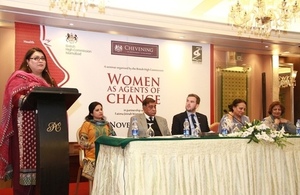British High Commission highlights women's role as 'Agents of Change'
The British High Commission in Islamabad hosted a Chevening debate today to recognise the importance of Pakistani women as agents of change in accelerating social, economic and political progress.

The debate follows on from an event held by the British High Commission in July to tackle sexual and other violence against women. It invited young aspiring women from different fields of study to debate with senior Chevening alumni on the important roles women can play in all aspects of society.
The keynote speakers, all Chevening alumni, include Yasmeen Rehman, former MNA and currently the Strategic Adviser on Improving Parliamentary Performance in Pakistan; Muhammad Aslam Khaki, Advocate in the Supreme Court of Pakistan; and Dr. Maryam Rab, former Registrar of Fatima Jinnah Women University, Rawalpindi. They were joined by Prof. Dr. Samina Amin Qadir, the Vice Chancellor of Fatima Jinnah Women University.
Speaking in advance of the event, the British High Commissioner to Pakistan Philip Barton CMG OBE said:
Today, we are highlighting just a few of examples of the important role that women play in Pakistan every day. They are not only victims of social crimes and violence, but are also a source of inspiration and a catalyst for change. In the last two years,
Pakistani women have brought home an Oscar, an Emmy, the Nobel Peace Prize and the Gold medal in cricket at the Asian Games. Pakistan also had the honour of being the first Muslim nation to have a female Prime Minister.
As a long standing partner of Pakistan, the UK is working with the Government of Pakistan and various non-government organisations to invest in the future of women and girls. Over the coming years, the UK will provide support which will benefit over five million girls in school, provide monthly cash transfers to women of 300,000 poorest families and help an additional 900,000 women to access microfinance loans. Our Chevening scholarship programme offers an opportunity for the future female leaders of Pakistan to be agents of change.
By investing in women and girls, countries can accelerate their social, economic and political development. I hope Pakistan will continue to encourage the involvement of women in all aspects of society. We will continue to support the government of Pakistan in this.
Notes to the Editor:
Contact: Press Attaché, British High Commission, Islamabad; tel. 051 201 2000